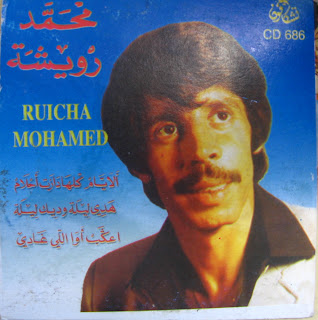Traveling street musician in Khenifra, Morocco. April, 2012.
Tuesday, August 7, 2012
Saturday, August 4, 2012
Mohamed Rouciha
Track 1
Track 2
Track 3
Track 4
Track 5
Track 6
More superb Mohamed Rouicha on the MasterOne label. Similar to the Inass Inass record, but with shorter songs and a hint of autotune on the female chorus.
Slow, hypnotic rhythms beat out on buzzing bendirs hand drums provide the backdrop for Rouicha's virtuosic outar playing. Highly recommended.
Friday, August 3, 2012
Nass El Ghiwane Sinia
Ouach Hna Houma Hna
The form of Moroccan music known as chaabi, which translates as, simply, "popular", now covers a large range of styles but began as a type of street music, performed in public markets and squares. However, by the 1970s, chaabi bands were pushing the music in a more sophisticated direction, combining Berber music with rituals from the milhun (a semi-classical form of sung poetry) and Sufi traditions, gnawa rhythms, reggae, and an image influenced by the international rock scene. (Might this be what led Martin Scorcese to later dub them the "Rolling Stones of North Africa"?) These new-era chaabi groups provided a distinctively Moroccan alternative to the imported Egyptian, Lebanese and Syrian musical styles which had been dominating Morocco's music culture at the time.
Arguably the most popular and well-respected (and also most political) chaabi group to emerge in this era was Nass El Ghiwane. Formed in Casablanca, and led by Hgnur Boujmia, Nass El Ghiwane took their name from the ghiwane, a tradition of traveling musical actors, and used the language of the street to address socially relevant topics. The initial impact of Nass El Ghiwane and other seminal chaabi groups had a major influence on the rai music of Algeria and is still being felt in the contemporary Moroccan chaabi scene.
This song comes from their early album, Sinia, recorded before their lead singer, Boujmia, died in a car crash in the early 1980s. Boujmia's powerful vocals feature on Oauch Hna Houma Hna, accompanied by banjo, sintir and percussion. Sentir, Banjo: Moulay Abdelaziz Allal
Bendir, Daadouh: Hgnur Boujmii
Bendir, Daadouh: Omar
Tbila: Larbi
Thursday, August 2, 2012
Subscribe to:
Comments (Atom)


